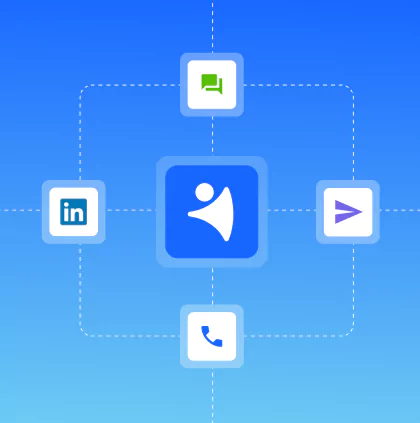A study by HubSpot reveals that only 45% of companies use CRM to store their lead and customer data. The remaining 55% rely on spreadsheets, text documents or - scary for those who have already realised the benefits of CRM - physical folders. Yikes.
This leads to messy, decentralised data and a rapid decay in the quality of customer service, lead nurturing, and ultimately sales and revenue. Implementing a sales CRM system goes a long way to tidy up your data-driven woes, but it doesn’t go all the way.
Why? Because some teams refuse to clean and tidy their CRM data regularly.
It sounds like hard work, but it’s not.
NetHunt knows how to improve the accuracy of your data and motivate your team members to update CRM regularly. Easily. In this article, you'll know:
Why is it crucial to regularly update CRM data?
Even the most advanced CRM systems, that offer extensive sales automation functionality, need to be regularly updated with fresh and relevant data. In fact, it’s the information you put into the system, either manually or automatically, that allows for the full functional potential of a system to reach. Data is the backbone of your CRM system.
Here are the other key reasons it’s mandatory for you to turn CRM hygiene into a company-wide culture...
- It ensures data accuracy, allowing you to rely on it during sales.
- It improves targeting.
- It improves customer retention.
- It allows you to create precise sales forecasts.
- It provides you with data to analyse and make data-driven decisions.
All in all, accurate data that regular CRM updates and cleanliness provide lays the foundation for your business processes. But it makes no difference whether or not the company’s C-Suite realises those if the team isn’t motivated to update the CRM regularly. As a manager, it’s your job to communicate the value of CRM software to your subordinates and encourage them to be timely and active with updating it.
How to motivate teams to keep CRM up to date
Depending on the peculiarities of your team, you’ll find some people are more susceptible to monetary incentives, while others would like to receive different forms of recognition for their efforts. This results in a multitude of approaches to increasing CRM adoption among the team.
Despite the differences, it’s your job to create favourable conditions for everyone on your team to know how to update the CRM system. They should be be encouraged to do it regularly and independently. Here’s our hot take on how you can achieve that!
Put CRM training on the team member onboarding agenda
"I don’t know how to use a CRM!"
Everyone puts ‘an adroit technology user’ on their CV, but not everyone is. Even as the CRM software market continues to grow and more and more companies implement CRM solutions in their business workflows, there’s still some workers that don’t know how to use it.
22% of salespeople don’t know what a CRM is.
Source: HubSpot
As competition gets tighter, and the number of players in the market increases everyday, CRM vendors try to differentiate themselves from competitors by introducing new functionality. So, even if your new employee has had experience with CRM, they could’ve used a different solution. Your solution might be completely alien to them.
In this scenario, make sure to include thorough CRM training in your onboarding process. There are some staple processes that you need to walk your new employee through step-by-step:
- How to create records.
- How to update records.
- How to assign tasks.
- How to create reports.
- How to create sales forecasts.
It’s also important to show all the data input formats and explain when which of them is used. This helps increase the cleanliness and accuracy of data. Schedule a demo call or demonstrate how to perform all of these and use any other crucial features your specific CRM offers in person.
Assign an in-house CRM manager
"I have no idea how to perform this task in CRM…"
Your job is to ensure that every member of your team has an opportunity to answer any sort of questions they have regarding the CRM system you use and receive a prompt response. To do that, you need to assign an in-house CRM expert to handle all the micro-training requests, share CRM productivity tips and tricks, and suggest how to deal with specific tasks.
- Update accounts and contacts in a CRM system.
- Monitor customer relation strategies.
- Recommend strategy improvements.
- Build workflows to manage processes better.
- Dynamise existing workflows and strategies.
- Coordinate meetings.
It’s best to turn to someone who is an active user of the CRM themselves, with hands-on experience for all the sales and business processes. That way, the expert doesn’t just know how to deal with different tasks in theory but can also give practical advice and help set up.
Check out main responsibilities of a CRM manager
Educate teams of the benefits of up-to-date CRM
"It’s good for the managers, not for me!"
You won’t motivate employees to update the system regularly if they don’t see a point in doing it. There’s still a stigma surrounding CRM software - many sales reps, to this day, believe that managers only use CRM to spy on their employees and track their every move.
While CRM is useful for creating sales team activity reports that help to boost team productivity, it’s not exclusively a tool for Big Brother to watch. Au contraire, there are way more benefits of maintaining the CRM for sales reps than there are for managers. You’re doing it for them, not for you - you need to communicate this idea clearly.
This leads to another CRM usage objection: ‘I don’t need a CRM, I’m super organised and can keep track of everything manually’. Out of fear that ‘machines will take over the world and replace me at my job’, many salespeople resist using CRM software and try to prove they’re capable of handling everything themselves.
It’s essential to remove this attitude. Explain to employees that they don’t become less valuable because they delegate some of their tasks to a dedicated software. On the contrary, doing so helps to manage their workload more effectively and deliver better results.
"Employees understand that if CRM is left unchecked and outdated, their workload would more than double, causing needless stress and extra work for them. With an updated CRM, they'll be able to spend more time selling and giving customer support and less time on the tedious labour of manually entering data."
David Bitton, CMO at DoorLoop
Some ways in which you could communicate the benefits of a well-maintained CRM system to your team include:
- Educational resources. Share an educational leaflet, guide, or series of articles that clearly outline all the ways in which updating CRM can help your employees achieve their goals easily.
- A talk. Discuss all the benefits of maintaining a CRM clean and updated in a private or a group conversation.
- A side-by-side comparison. Confucius was a wise bloke, so why not put his words to action: “Tell me, and I will forget. Show me, and I will remember. Involve me, and I will understand forever.” Explain why maintaining a CRM is crucial by letting your employees do their job the old way and then try and handle the sales process with the use of the CRM system immediately after.
Automate as much as possible
‘I’d rather spend my time actually selling instead of wasting it on administrative work.’
Fair enough. Sales reps have quotas to meet, so they value every second of their time and don’t want to spend it on tasks that aren’t directly related to selling. Take manual data entry out of the equation. Considering you’ve successfully educated your sales reps on the benefits of maintaining a CRM, they shouldn’t never oppose the idea itself.
The majority of modern CRM systems offer automation for different processes; you just need to choose the software that suits your needs best. Here are just a few of the things you can automate to encourage your team to update the CRM:
- Customer record creation. Create customer records from an email in one click and autolink all the emails to the client record.
- Lead generation. For instance, you could leverage the benefits of web form lead generation to make sure your data is clean and complete and goes straight into the CRM system without a sales rep having to put it in themselves.
- Task assignment. Configure a workflow that would automatically assign tasks to sales reps.
- Notifications. Don’t worry about alerting salespeople about new tasks - let your CRM do the job for you.
- Lead nurturing. Make sure your lead nurturing outreach is always timely and relevant by setting up trigger-based automated email sequences.
Ensure accessibility of the CRM
"I’m away from my computer, so I’ll just write it down in the notes app on my phone."
Sales are an ongoing process: you never know when you’ll finally get a million-dollar opportunity, so you need to stay alert at all times. If you want your team to use the CRM and update it regularly, you need to ensure it’s convenient for them to do so.
Choose software that offers a mobile app so your sales reps can make updates on the go, is cloud-based, so they aren’t tied to their office desk exclusively; and has a permissions system so data is safe regardless of where the system is being accessed from.
Be an example for employees
"My boss isn’t doing it, so I won’t be doing it either."
This piece of advice is an obvious one, but it’s still often overlooked by a lot of sales managers and C-Suite executives. If you want your employees to do something, be the first one to set an example. If you’re jotting down details of your most recent call with a customer on a piece of paper or creating a sales forecast in spreadsheets, it’s unfair to expect your team to do the right thing.
Be the sales professional you want them to be.
Set specific goals that can only be tracked in CRM
"I can calculate it myself."
If you want your employees to use the CRM more regularly, set KPIs that can only be tracked with the use of a CRM system.
"Say “no” to direct daily control over employees. It is better to give every department clear KPIs that they can track on CRM. You should have a clear understanding of your own business goals, not the general wording of "sales and profit growth", but specific goals: for example, increasing the number of repeat requests, etc."
Tim Absalikov, CEO at The Lasting Trend
If you’re looking for an even more effective, slightly meaner, approach to CRM updating motivation, implement the ‘if it’s not in the CRM, it didn’t happen’ policy for your sales team. Unless a call, an email convo, or an Intercom chat was recorded in the system, it doesn’t contribute towards their KPI.
You’ve got to be cruel to be kind.
Encourage your sales reps to work together
"I’m on track with my data updates - I understand my notes."
Teamwork makes dreams work. All members of your team need to be on the same page to work collaboratively and generate the desired results. This is only possible if all of them have access to the same data and this data is fresh and relevant. Out of sheer need, your team members will start using the CRM because it’s the easiest way to increase team productivity and stay updated regarding the latest developments of the task.
Moreover, when working collaboratively, members of your sales team will be able to see the impact each of them makes in achieving the sales quota. This will motivate them to help each other to sell more and achieve the shared team goals faster. Besides, the competition can motivate your sales team to work more efficiently and make their way to the top of the leaderboard.
- Create quarterly goals for commission-paid sales reps where the sales rep with the cleanest data earns a monetary bonus.
- Set up a leaderboard among your employees and recognise the most active CRM users on a weekly or monthly basis. This would encourage employees to update the system more regularly to get on the board.
- Include more active CRM usage in your employees’ personal growth plan.
NetHunt recommends...
Hoopla by Raydiant is a sales gamification software with a heap of different features to get the adrenaline flowing for a sales team. Beautiful sales leaderboards offer up-to-date insights on team performance; heated sales contests such as battles, tournaments, races, and face-offs engage the workplaces; deal alerts offer on the spot recognition for employees who smash a big deal; and showcases put those sales leaders on a pedestal.
That’s all the updates on our side. Now, it’s time for you to get updating.
Good luck and let’s get growing!




















 product experts — let's find the best setup for your team
product experts — let's find the best setup for your team